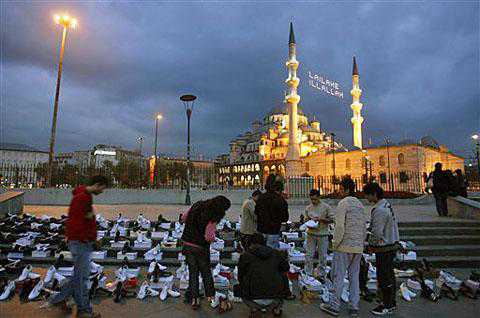(Osh) – The government of Kyrgyzstan should take immediate measures to ensure safety for people attempting to flee unchecked violence in southern Kyrgyzstan, Human Rights Watch said today. Human Rights Watch reiterated its call for a UN-mandated force to assist the Kyrgyz government in providing protection and stopping ethnic violence engulfing Osh and spreading to other cities in southern Kyrgyzstan.
“People are desperate to escape the violence but without international assistance there’s no way out, and every minute of delay is costing lives,” said Andrea Berg, Central Asia researcher at Human Rights Watch, who left Osh on June 13, 2010. “The Kyrgyz authorities need to set up effective measures to protect people and negotiate safe access for those who want to flee.”
Arson and other attacks continued on June 13, with residents reporting that a school and homes were on fire. A man in one ethnic Uzbek neighborhood in the center of Osh described to Human Rights Watch how gangs would drive through the neighborhood, set houses on fire, and shoot at people trying to flee. The gangs would leave when the military arrived, but then return as soon as the military left the neighborhood.
Eyewitnesses in Cherеmyshki, a neighborhood just west of the city center, told Human Rights Watch that gangs torched Uzbek houses and shot at people who attempted to flee. Gangs surrounded the neighborhood, preventing many from escaping.
A Human Rights Watch researcher saw burned out neighborhoods, burned cars, and barricaded neighborhoods, with some lone buildings and cars – marked KG, presumably for “Kyrgyz” – untouched.
The government of Kyrgyzstan sent security forces to Osh on June 12 and granted them shoot-to-kill authority, which Human Rights Watch said would inevitably lead to violations of the right to life. A man from Cheremyshki told Human Rights Watch that uniformed personnel and others clearly identified as official forces were also involved in the shooting in the neighborhood, although it is unclear if the Uzbeks were armed or presented any threat.
Meanwhile, ethnic violence worsened in Jalal-Abad, 50 miles from Osh, with Akipress, a Kyrgyz wire service, reporting gunfights and torching of homes, and that ethnic Uzbeks had fled.
The humanitarian situation in Osh and at the Kyrgyz-Uzbek border has grown increasingly desperate. A Human Rights Watch staff member in Osh received a flood of telephone calls from desperate people begging for assistance with evacuation, food, and medical aid. Several callers told Human Rights Watch that vulnerable groups including children and pregnant women are in especially urgent need for food and medical assistance. Humanitarian aid groups present in the city when the attacks began have not been able to provide assistance due to the dangerous security situation.
The poor security situation has also prevented delivery of humanitarian supplies to the thousands of ethnic Uzbeks who are fleeing the violence and massing at different points along the border with Uzbekistan.
Human Rights Watch called on the international community to work with the Kyrgyz government to provide for the protection and humanitarian needs of ethnic Uzbeks who are fleeing the violence and massing at different points along the border with Uzbekistan.
One source told Human Rights Watch that an Uzbek friend had said that gangs had driven toward the border and shot at people gathered there. It is not known whether any one was harmed as a result.
“The international community urgently needs to work with the government of Kyrgyzstan to ensure that humanitarian supplies can be delivered to the border areas,” Berg said.
Human Rights Watch also urged the government of Uzbekistan to keep the border open and allow all those seeking protection to cross. Although Uzbekistan has not ratified the 1951 Refugee Convention, Human Rights Watch urged the government of Uzbekistan at least to provide temporary protection to all Kyrgyz nationals seeking entry at the border and to allow the UN High Commissioner for Refugees to provide emergency assistance for them.
Human Rights Watch also urged the Kyrgyz government to reverse its decision to give security forces powers to shoot to kill. It further urged all parties that engage in law enforcement action to adhere to the UN Basic Principles on the Use of Force and Firearms by Law Enforcement Officials and the Code of Conduct for Law Enforcement Officials, which call for law enforcement officials to take steps to preserve and protect human life and resort to lethal force only as a last resort.
